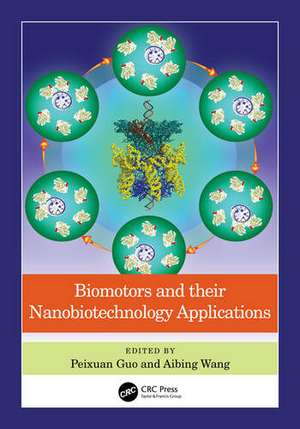Biomotors and their Nanobiotechnology Applications
Editat de Aibing Wang, Peixuan Guoen Limba Engleză Paperback – 19 dec 2024
| Toate formatele și edițiile | Preț | Express |
|---|---|---|
| Paperback (1) | 452.17 lei 43-57 zile | |
| Taylor & Francis Ltd. – 19 dec 2024 | 452.17 lei 43-57 zile | |
| Hardback (1) | 1422.55 lei 22-36 zile | +48.14 lei 5-11 zile |
| CRC Press – 31 iul 2023 | 1422.55 lei 22-36 zile | +48.14 lei 5-11 zile |
Preț: 452.17 lei
Nou
Puncte Express: 678
Preț estimativ în valută:
86.60€ • 89.22$ • 72.54£
86.60€ • 89.22$ • 72.54£
Carte tipărită la comandă
Livrare economică 24 februarie-10 martie
Preluare comenzi: 021 569.72.76
Specificații
ISBN-13: 9781032313146
ISBN-10: 1032313145
Pagini: 414
Dimensiuni: 178 x 254 mm
Greutate: 0.75 kg
Editura: Taylor & Francis Ltd.
ISBN-10: 1032313145
Pagini: 414
Dimensiuni: 178 x 254 mm
Greutate: 0.75 kg
Editura: Taylor & Francis Ltd.
Notă biografică
Peixuan Guo is the Director of the NIH Nanomedicine Development Center at the University of Cincinnati, Ohio and the Director of the NIH/NCI Cancer Nanotechnology Platform Partnership Program: RNA Nanotechnology for Cancer Therapy at Purdue University, Indiana. He is also a Fellow of the National Academy of Inventors.
Aibing Wang is a Molecular Biologist in Department of Oncology, Lombardi Comprehensive cancer center, Georgetown University Medical Center and a chemist in SynerGene Therapeutics, Inc. (SGT).
Aibing Wang is a Molecular Biologist in Department of Oncology, Lombardi Comprehensive cancer center, Georgetown University Medical Center and a chemist in SynerGene Therapeutics, Inc. (SGT).
Cuprins
1. Biological nanomotors with linear, rotation, or revolution motion mechanism. 2. Classifications and typical examples of Biomotors. 3. Structure of revolving biomotors. 4. Structure of rotation motors. 5. Structure of linear motors. 6. Mechanical Properties of Molecular Motors and the Relevance to Their Biological Function. 7. Molecular Mechanism of AAA-ATPase Motor in the 26S Proteasome. 8. General mechanism of biomotors. 9. Mechanism of revolving motors. 10. Mechanism of rotary motors. 11. Mechanism of linear motors. 12. Finding of widespread viral and bacterial revolution dsDNA translocation motors distinct from rotation motors by channel chirality and size. 13. The ATPase of the phi29 DNA packaging motor is a member of the hexameric AAA+ superfamily. 14. Arginine Finger Serving as the Starter of Viral DNA Packaging Motors. 15. Three-step channel conformational changes common to DNA packaging motors of bacterial viruses T3, T4, SPP1, and Phi29. 16. Sequence Dependence of Reversible CENP-A Nucleosome Translocation 17. Same function from different structures among pac site bacteriophage (TerS) terminase small subunits. 18. Kinetic study of the fidelity of DNA replication with higher-order terminal effects. 19. Multilevel Control of the Activity of p97/Cdc48, A Versatile Protein Segregase. 20. High resolution structure of hexameric herpesvirus DNA-packaging motor elucidates revolving mechanism and ends 20-year fervent debate. 21. Methods for Single-Molecule Sensing and Detection Using Bacteriophage Phi29 DNA Packaging Motor. 22. Instrumental design of five-dimensional single particle tracking. 23. The appropriate ratio of retroviral structural proteins is activated by the spleen necrosis virus post-transcriptional control element. 24. Translation of the long-term fundamental studies on viral DNA packaging motors into nanotechnology and nanomedicine. 25.Translocation of Peptides through Membrane-Embedded SPP1 Motor Protein Nanopores 26. Insertion of channel of phi29 DNA packaging motor into polymer membrane for high-throughput sensing. 27.Engineering of protein nanopores for sequencing, chemical or protein sensing and disease diagnosis 28. Phage Portal Channels as Nanopore Sensors. 29. Controlled Co-assembly of Viral Nanoparticles of Simian Virus 40 with Inorganic Nanoparticles: Strategies and Applications 30. Potential of 3Dpol As An Enzymatic Reader for Direct RNA Sequencing. 31. Channel from bacterial virus T7 DNA packaging motor for the differentiation of peptides composed of a mixture of acidic and basic amino acids. 32. Nano-channel of viral DNA packaging motor as single pore to differentiate peptides with single amino acid difference.
